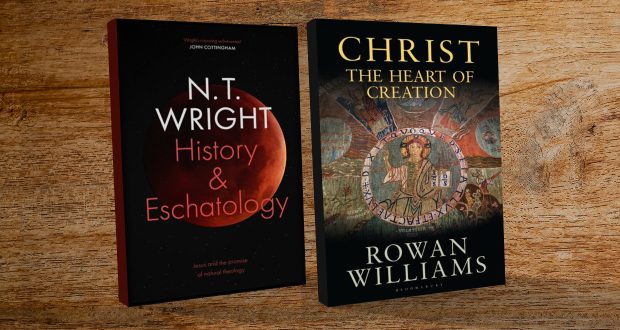Tom Wright and Rowan Williams are two of the most prominent British theologians, capable of both writing for a popular audience and getting into the midst of scholarly debate. Nick Mattiske reviews their recent books.
Though their latest books—History and Eschatology and Christ the Heart of Creation—lie beyond their more populist work, Wright and Williams tackle, intriguingly and in their own manner, the way Christ sits in history, and link Christ to notions normally associated with the Father.
Wright’s hefty, provocative book History and Eschatology concerns natural theology, but he flips it on its head. He argues that if we take natural theology to mean knowledge about God that excludes special revelation but finds evidence of God the Father’s hand in creation, then argument as to whether Jesus rose from the dead falls within that, not outside, as is usually argued, because resurrection in the New Testament is a historical event, even if of a unique kind.
What matter here, of course, are witness and evidence. Wright says the disciples thought they had witnessed resurrection. Much later, historians and some theologians thought we needed to discount the disciples’ testimony as biased—blind, Wright suggests, to their own bias, which tended to separate, unnaturally, the spiritual and the everyday, or indeed to the fact that everyone has a perspective from which they tackle history.
Wright goes through, in detail, discussions beginning in the 18th century about how the supernatural should be dismissed, how the Enlightenment built on older, Greek ideas of what could be termed reality, including the separation of heaven and earth, which was different to Jewish thought, how present ideas of God working in history (or not) are off-track, and ultimately argues that Christianity helps explain the brokenness of history (something he also argues in shorter and less complex fashion in his recent Broken Signposts).
He also argues, as he does in his Christian Origins and the Question of God series, that Christians have nothing to fear from the study of history, and that Jesus is not some radical break from the way God works in history, but a continuation, and that the Kingdom of God concerns “real life”.
In Christ the Heart of Creation, Rowan Williams writes about the divinity and humanity of Christ, and likewise argues that history and the supernatural are not quite what we might have been led to believe. Those readers familiar with Christology will know how it can get into convoluted terminology and conceptual gymnastics, and Williams, when not writing for a popular audience, can get rather heavy too. It’s tricky stuff, and hard to summarise (and language obviously has its limits). How can an omniscient God become human without losing his God-ness? How can the infinite and finite co-exist?
Williams argues, like Wright, that the supernatural is not an occasional interruption into the “real” world but the context in which the “real” world happens. Similarly, regarding Christology, he argues that divinity and humanity in Jesus are not two separate things, but where we see God most fully, the way God identifies, unhindered, with our suffering.
As for the “creation” in the book’s title, Williams suggests that the relationship of Father and Son is an analogy for the relationship of creator and creation—not two separate things, but a more complex relationship that involves inseparability. Additionally, he suggests that Christ’s work is like the Father’s—choosing and sustaining a people, reconciling, giving unequivocally, having fidelity in the face of evil. Ultimately, Christ, like the Father, creates life.
Nick Mattiske
Nick Mattiske is a bookseller and blogs at Coburg Review of Books.
History and Eschatology
Author: N.T. Wright
Publisher: SPCK
2019
To purchase visit SPCK
Christ the Heart of Creation
Author: Rowan Williams
Publisher: Bloomsbury
2018
To purchase visit Bloomsbury
 JourneyOnline
JourneyOnline







